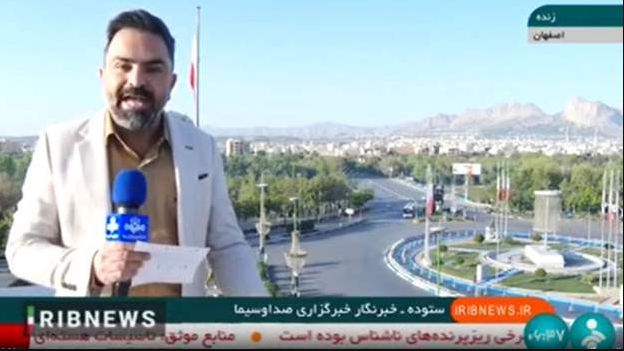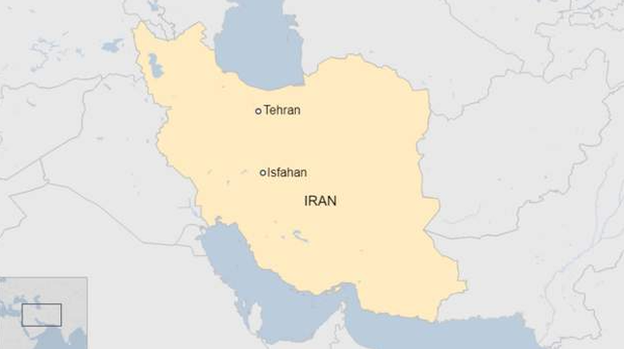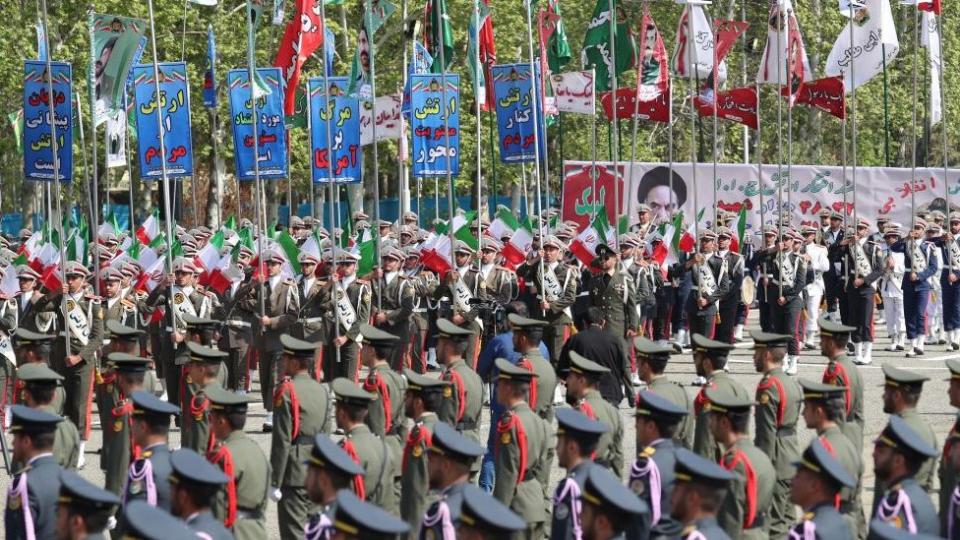US officials say Israel struck Iran with a missile overnight on Friday, in what appears to be a retaliatory attack after weeks of escalating tensions between the two countries.
There are competing claims about the scale of the attack on the Isfahan region and the extent of any damage, with Iranian state media downplaying its significance.
It comes after weeks of rising tensions between the regional rivals, who have already experienced an Israeli attack on an Iranian compound in Syria, and Iran launching an unprecedented attack on Israel.
Here’s everything we know so far about the latest incident.
How do we know there has been a strike?
Israel does not routinely confirm its military actions, which have repeatedly targeted Iranian-backed armed groups in Syria and Iraq.
However, US officials confirmed to BBC’s partner CBS News that an Israeli missile struck Iran in the early hours of Friday. It is very likely that the US would have been informed of the plans in advance.
It is unclear what type of weapons were used and where they were launched from.
US sources said a missile was involved in the attack, while Iran said small drones were involved.
The Iranian government strictly controls access to the country. The BBC does not have direct access to the central region of Isfahan, where this incident occurred overnight.
What does Iran say about the attack?
Iranian officials and media have confirmed there was an attempted strike but have played down its significance. There are no reports of casualties.
Iran’s Fars news agency said explosions were heard near an army base and air defense systems were activated.
A state media outlet quoted a general in Isfahan as saying that explosions heard in the area “were the result of air defense fire on suspicious objects”, and said no damage had been caused.

Iran’s semi-official Tasnim news agency, which is close to the military wing of Iran’s Islamic Revolutionary Guard Corps, posted a video of a nuclear facility in Isfahan showing no sign that it had been hit.
The International Atomic Energy Agency has confirmed that no damage was caused to Iran’s nuclear facilities.
Hossein Dalirian, a spokesman for Iran’s National Center for Cyberspace, said there was “no airstrike from outside the borders.”
He said Israel had “just made a failed and humiliating attempt to fly quadcopters [drones] and the quadcopters were also shot down”.
Iran imposed restrictions on commercial flights in the hours immediately after the attack, but these have now been lifted.
Why was Isfahan targeted and why now?
Isfahan Province is a large area in central Iran that takes its name from its largest city.
The region is home to significant Iranian military infrastructure, including a large air base, a large missile production complex and several nuclear facilities.


This latest attack comes less than a week after Iran launched hundreds of missiles and drones at Israel, an incident seen as a dramatic escalation of tensions.
Despite its enormous size and unprecedented nature, Iran’s attack was largely unsuccessful, with the vast majority of projectiles shot down by Israeli air defenses with the help of the US, Britain and other allies.
This unprecedented attack on Israeli territory was in response to an attack on a building at an Iranian diplomatic compound in Syria on April 1.
Israel has also not publicly confirmed that it was behind this attack, but it is widely accepted that it was.
Will this increase tensions between Israel and Iran?
The full significance of this latest attack is still emerging and it is not yet known whether Iran will attempt to respond.
BBC security correspondent Frank Gardener described the scale of Friday’s attack as “limited, almost symbolic”, and possibly aimed at ensuring the conflict does not progress further.
Israeli Prime Minister Benjamin Netanyahu will face competing pressure from some of his own generals and political allies to push back against Iran, according to BBC international editor Jeremy Bowen.


Israel is under enormous international pressure from the US and other Western allies not to take any action that risks turning the long-running proxy war between the two Middle East rivals into a direct conflict.
This flare-up of hostilities comes against the backdrop of the war in Gaza, where the Israeli army is fighting the Iranian-backed Hamas.
How has the global economy responded?
There are concerns that a worsening conflict in the Middle East could disrupt oil supplies.
Brent crude, the international benchmark for oil prices, rose 1.8% to $88 a barrel after the attack.
Oil prices initially rose by as much as 3.5%, but the price stabilized as it became clearer that the strike was limited.
The price of gold – often seen as a safe investment in times of uncertainty – briefly neared a record high before falling back to almost $2,400 an ounce.






